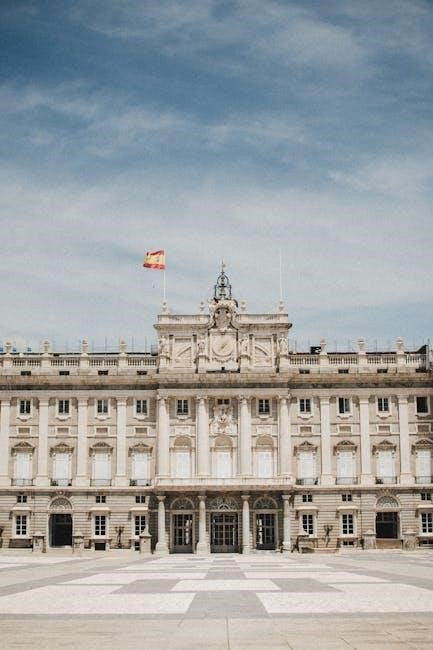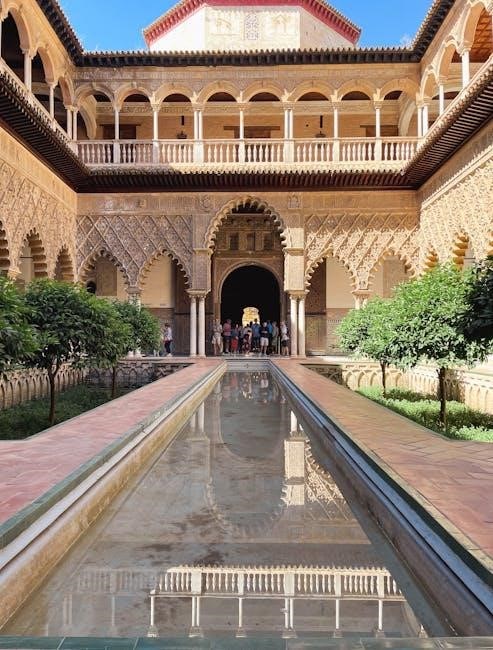Spain’s Royals and Their Role in Guiding the Nation
Spain’s monarchy has historically guided the nation through significant transitions‚ fostering democracy and national unity‚ with King Juan Carlos pivotal in the democratic shift and King Felipe VI continuing this legacy‚ promoting cultural and social progress.
Spain’s royal family‚ led by King Felipe VI‚ plays a central role in the nation’s identity and governance. The monarchy‚ known for its historical significance‚ has adapted to modern times while maintaining deep cultural ties. The current monarch‚ King Felipe VI‚ ascended to the throne in 2014‚ following the abdication of his father‚ King Juan Carlos I‚ who was instrumental in Spain’s transition to democracy. The royal family‚ including Queen Letizia and their daughters‚ Princess Leonor and Infanta Sofía‚ actively engages in promoting Spanish culture‚ unity‚ and social causes. Their responsibilities include official duties‚ state visits‚ and supporting national institutions‚ reflecting their commitment to guiding Spain through contemporary challenges while preserving its rich heritage.
Historical Context of the Spanish Monarchy
The Spanish monarchy‚ one of Europe’s oldest‚ has played a pivotal role in shaping the nation’s history and identity. Originating in the medieval kingdoms of Castile and Aragon‚ the monarchy unified Spain under a single rule‚ with notable figures like Ferdinand and Isabella establishing a strong centralized state. The Spanish Empire’s rise in the 16th century further cemented the monarchy’s influence‚ though challenges like political instability and wars tested its resilience. The 20th century brought significant change‚ as the monarchy endured through dictatorship and transitioned to democracy. King Juan Carlos I’s leadership during this period was instrumental in guiding Spain toward democratic governance. Today‚ the monarchy continues to evolve‚ balancing tradition with modernity‚ under King Felipe VI. Its historical legacy underscores its enduring role in guiding Spain through political‚ cultural‚ and social transformations‚ maintaining a connection to the past while embracing contemporary responsibilities.
The Transition from Dictatorship to Democracy
The Spanish monarchy played a crucial role in guiding the nation’s transition from dictatorship to democracy following General Francisco Franco’s regime. King Juan Carlos I‚ who ascended to the throne in 1975‚ became a key figure in this process. Unlike previous monarchs‚ he embraced democratic ideals‚ distancing himself from Franco’s authoritarian legacy. The king’s leadership was instrumental in navigating the country through a tumultuous period‚ fostering dialogue between political factions and ensuring stability; The adoption of the 1978 Constitution marked a significant milestone‚ establishing Spain as a parliamentary monarchy and a democratic state. The monarchy’s adaptability and commitment to democratic values helped regain public trust and solidified its relevance in modern Spain. This era underscored the monarchy’s ability to evolve and serve as a unifying force during times of profound change‚ setting the stage for Spain’s integration into the European Community and its emergence as a modern‚ democratic nation.

The Role of the Spanish Monarchy in Modern Times

Spain’s monarchy continues to guide the nation by promoting unity‚ cultural heritage‚ and social progress. King Felipe VI focuses on modernizing the institution‚ fostering national identity‚ and supporting democratic values‚ ensuring relevance in contemporary society.
King Juan Carlos and the Transition to Democracy
King Juan Carlos played a pivotal role in guiding Spain’s transition from dictatorship to democracy following General Francisco Franco’s death in 1975. His leadership was instrumental in navigating the country through a tumultuous period‚ ensuring a peaceful shift toward democratic governance. By supporting the 1978 Constitution‚ King Juan Carlos laid the foundation for a modern‚ democratic Spain. His actions‚ including the stabilization of political institutions and the promotion of national unity‚ were crucial in establishing a framework for democratic reforms. The monarch’s commitment to democracy and his ability to balance tradition with modernity earned him widespread respect. King Juan Carlos’s reign marked a significant turning point‚ as he transformed the monarchy into a symbol of democratic values and national identity; His legacy continues to influence Spain’s political landscape‚ highlighting the monarchy’s role in fostering stability and progress during a critical era.
The Current Monarch‚ King Felipe VI
King Felipe VI‚ who ascended to the throne in 2014‚ has continued the legacy of guiding Spain with a focus on modernization and adaptability. His reign emphasizes transparency‚ austerity‚ and a closer connection to the people‚ reflecting the evolving expectations of Spanish society. Felipe VI has prioritized the promotion of Spanish culture‚ economy‚ and innovation on the global stage‚ strengthening the nation’s international presence. He has also championed social causes‚ advocating for equality and environmental sustainability‚ aligning the monarchy with contemporary values. The king’s commitment to national unity is evident in his efforts to address regional diversity while upholding the principles of democracy. By balancing tradition with modernity‚ King Felipe VI ensures the monarchy remains relevant and a unifying force in Spain’s complex political and social landscape.
The Royal Family’s Influence on Cultural Affairs
The Spanish royal family has long been a cornerstone in promoting and preserving the nation’s rich cultural heritage. Through their active patronage of the arts‚ they have supported numerous cultural institutions‚ museums‚ and festivals‚ ensuring the dissemination of Spanish history and creativity. The monarchy’s involvement in educational initiatives and scholarships has nurtured emerging artists and intellectuals‚ enriching the cultural landscape. Their presence at significant cultural events and ceremonies underscores the importance of Spain’s traditions and innovations. By fostering international cultural exchanges‚ the royal family has positioned Spain as a global leader in artistic and intellectual endeavors. This dedication to cultural affairs not only strengthens national identity but also inspires future generations to embrace and contribute to Spain’s vibrant heritage.

Guiding the Nation Through Challenges
Spain’s royals have played a pivotal role in guiding the nation through political transitions and societal challenges‚ ensuring stability and unity while fostering cultural progress and modernization.
The Monarchy’s Role in Promoting National Unity
Spain’s royal family has long served as a unifying force‚ transcending political divisions and fostering a shared sense of identity. Historically‚ the monarchy has acted as a stabilizing institution‚ embodying the continuity of the Spanish state. During times of crisis‚ such as the transition to democracy‚ the royals played a crucial role in bridging societal gaps. King Juan Carlos‚ in particular‚ was instrumental in uniting the nation after the fall of the dictatorship‚ while King Felipe VI continues this legacy by promoting inclusivity and national pride. The monarchy’s ability to connect with diverse regions and cultures within Spain has been key in maintaining cohesion. Through symbolic acts‚ public engagements‚ and support for national initiatives‚ the royals have consistently reinforced the idea of a unified Spanish identity‚ ensuring that the monarchy remains a cornerstone of national unity and stability.
Royal Patronage and Support for the Arts
Spain’s royal family has consistently demonstrated a deep commitment to fostering and preserving the nation’s rich cultural heritage. Through royal patronage‚ the monarchy has supported countless artistic endeavors‚ from music and theater to visual arts and literature. King Juan Carlos and Queen Sofía were particularly instrumental in promoting Spain’s cultural identity‚ often attending exhibitions‚ concerts‚ and performances that showcased Spanish talent. The royal family has also been a steadfast supporter of institutions like the Prado Museum and the Royal Theatre‚ helping to maintain their global reputation. King Felipe VI and Queen Letizia have continued this tradition‚ emphasizing the importance of arts education and accessibility. Their efforts have not only highlighted Spain’s artistic legacy but also encouraged innovation and creativity in contemporary arts. This patronage has strengthened Spain’s cultural influence both domestically and internationally‚ ensuring the arts remain a vibrant part of national life.
The Royals’ Involvement in Social and Humanitarian Causes
The Spanish royal family has long been dedicated to advancing social and humanitarian causes‚ demonstrating their commitment to the well-being of citizens and global communities. Queen Sofía‚ in particular‚ has been a steadfast advocate for organizations supporting people with disabilities and vulnerable populations. Her work with the Queen Sofía Foundation has addressed issues such as social exclusion and disability rights‚ leaving a lasting impact. Similarly‚ Queen Letizia has championed education‚ health‚ and women’s empowerment‚ often visiting schools and hospitals to highlight these causes. King Felipe VI has also emphasized the importance of social solidarity‚ supporting initiatives to combat poverty and inequality. The monarchy’s involvement in humanitarian efforts reflects their role as a unifying force‚ connecting with the public and fostering compassion. By engaging with these issues‚ the royals continue to guide the nation toward a more inclusive and equitable society‚ reinforcing their relevance in modern Spain. Their efforts resonate deeply with the public‚ ensuring a lasting legacy of care and commitment.
Spain’s royals have left an enduring legacy‚ guiding the nation through democracy‚ promoting unity‚ and fostering cultural progress. Their adaptability to modern expectations ensures their continued relevance in shaping Spain’s future identity.

The Enduring Legacy of Spain’s Royals

The Spanish monarchy has left an indelible mark on the nation’s history and identity. From guiding the country through its transition to democracy to fostering cultural and social progress‚ the royals have played a pivotal role in shaping Spain’s modern identity. Their ability to adapt to changing times while preserving traditions has ensured their relevance in contemporary society. Historical figures like King Juan Carlos were instrumental in navigating Spain’s political transformation‚ while current monarchs‚ such as King Felipe VI‚ continue to promote unity and cultural enrichment. The monarchy’s legacy is deeply intertwined with Spain’s journey toward democracy and its commitment to national unity. Their enduring influence reflects a balance between tradition and modernity‚ ensuring the royal family remains a symbol of continuity and progress for future generations.
The Future Role of the Monarchy in Spain
The future role of the Spanish monarchy will likely focus on maintaining its symbolic and unifying presence while adapting to modern societal expectations. King Felipe VI is expected to continue fostering national unity and promoting Spain’s cultural identity on the global stage. The monarchy’s ability to balance tradition with contemporary values will be crucial in sustaining public support. Modernization efforts‚ such as increased transparency and engagement with social causes‚ will help the royal family remain relevant. Public perception will play a significant role in shaping the monarchy’s future‚ emphasizing the need for the royals to stay connected to the people while upholding their historical legacy. By navigating these challenges‚ the Spanish monarchy can continue to serve as a stabilizing force in the nation’s evolving political and cultural landscape.
Public Perception and the Modern Relevance of the Royal Family
Public perception of Spain’s royal family varies‚ with some viewing them as a unifying symbol of national identity and others questioning their relevance in a modern‚ democratic society. King Felipe VI has sought to enhance the monarchy’s image by emphasizing transparency‚ accountability‚ and a connection to everyday Spaniards. His focus on social issues‚ education‚ and cultural promotion has helped maintain the royal family’s relevance. However‚ debates about the monarchy’s role in contemporary Spain persist‚ particularly among younger generations who may see it as less essential to the nation’s progress. Despite these challenges‚ the royal family continues to play a significant role in fostering national pride and unity‚ adapting to changing times while preserving their historical legacy. Their ability to balance tradition with modernity will be key to maintaining public support and ensuring their enduring place in Spanish society.
The Balance Between Tradition and Modernity
The Spanish royal family has skillfully navigated the balance between preserving historical traditions and embracing modernity‚ ensuring their relevance in contemporary society. King Felipe VI has championed a more modern‚ approachable monarchy‚ engaging with citizens through digital platforms and addressing current issues such as climate change and gender equality. While maintaining centuries-old customs and ceremonies‚ the royals have adapted to societal changes‚ reflecting the evolving values of Spain. This blend of tradition and innovation has helped the monarchy remain a respected institution‚ honoring its legacy while staying attuned to the needs of a modern nation. By supporting cultural heritage and promoting progressive causes‚ the royal family demonstrates its commitment to both the past and the future‚ ensuring a harmonious coexistence of tradition and modernity in Spain’s evolving landscape; This balancing act is crucial for sustaining public support and ensuring the monarchy’s enduring role in Spanish life.
